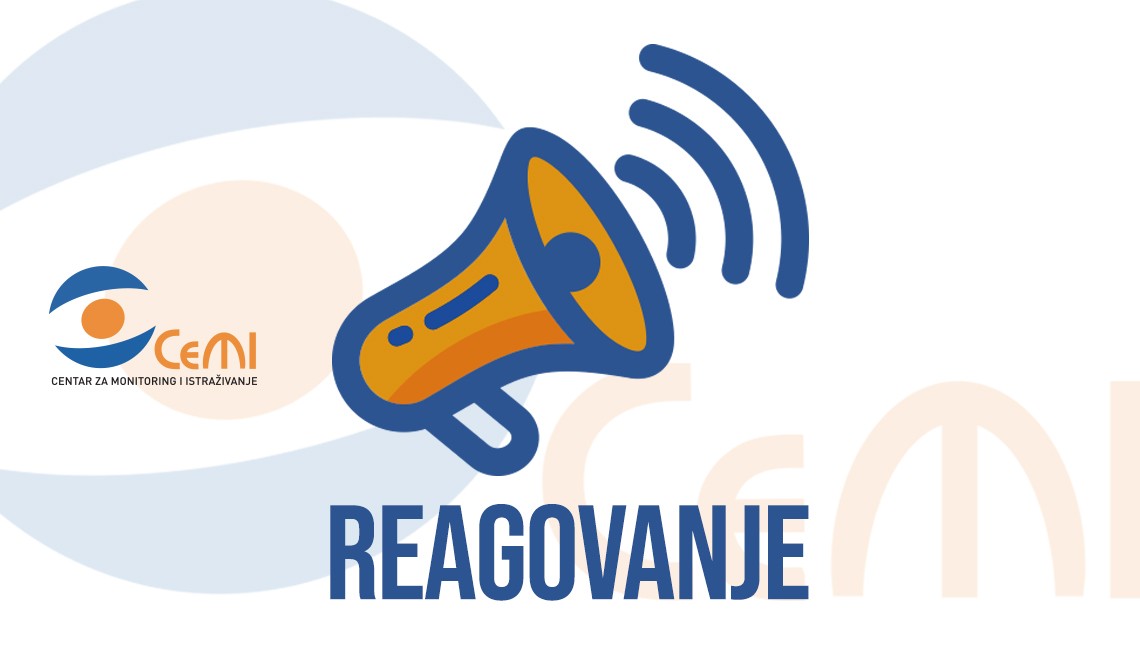The Centre for Monitoring and Research (CeMI) expresses a strong protest against the opinion of the Agency for the Protection of Personal Data and Free Access to Information (AZLP) that, contrary to all positive legal regulations in Montenegro, authorized and accredited observers should not be allowed to see the signatures of support for the electoral lists for the upcoming parliamentary elections.
Namely, yesterday in the premises of the old government building, a meeting was held attended by members of the SEC, AZLP, NGOs and ODIHR, regarding the request of non-governmental organizations accredited for election observation to inspect the signatures of support for the electoral lists.
AZLP remained with the opinion they gave during the presidential elections, that authorized observers do not have the right to see the signatures of support for electoral lists for the upcoming parliamentary elections.
We faced the same situation during the presidential elections, and this practice was publicly condemned by all international observation missions. It is not too bad to recall all the disputed situations that followed in connection with illegal ways of obtaining signatures of support.
We emphasize that this, until now, approach of the SEC and the AZLP cast a negative light on the transparency and integrity of the elections, and we expect them to take responsibility for all the consequences, both nationally and internationally.
Citizens have the right to full transparency, especially considering the general political context, as well as the right to full and accurate information regarding all segments of the electoral process. The irony is that the Agency for the Protection of Personal Data and Free Access to Information limits their right.
CeMI will take further legal steps to protect the public's right to know, as well as the full integrity and transparency of the upcoming elections.
Therefore, we invite all citizens to promptly report any suspicions of possible misuse of their personal data and signatures, in order to respond promptly.
Legal clarification
We sought insight into the relevant documentation in accordance with the provisions of the Law on the Election of Councilors and Members of Parliament of Montenegro, the Law on the Protection of Personal Data, as well as international documents and confirmed conventions of the United Nations, the Council of Europe and the Organization for European Security and Cooperation (OSCE).
More precisely, in Article 111a. The Law on the Election of Councilors and Members of Parliament of Montenegro states that authorized representatives of domestic non-governmental organizations, registered to monitor the exercise of political freedoms and rights, can monitor the course of elections and the work of election enforcement authorities. Additionally, Article 11c specifies that the observation period starts from the day the election is announced and ends with the publication of the final election results, while Article 111d precisely stipulates that the election enforcement authorities are obliged to enable foreign and domestic observers to monitor the course of the election and the work of the election enforcement authorities. .
Within the aforementioned articles, there are no restrictions in relation to individual aspects of the electoral process.
In relation to the regulations of the Personal Data Protection Act, Article 13, Paragraph 6 stipulates that when processing personal data is carried out within the legal activities of non-governmental organizations, i.e. associations or other non-profit organizations with political, philosophical, religious or trade union goals, if data refer only to members of that organization or persons who have constant contact with it in connection with the purpose of its activity, and if such data are not published without the consent of those persons, special categories of personal data may be processed.
Consequently, Article 17 further states that if the conditions from Art. 10 and 13 of this law, and bearing in mind the purpose of verification by the authorized election monitoring organization, the controller of the collection of personal data must provide the third party, i.e. the user of personal data, at his request with the personal data he needs.
However, despite clear legal argumentation, as well as international practice, according to the opinion of AZLP, which stems from the extremely restrictive interpretation of the Law on the Protection of Personal Data, we are not allowed to inspect the documents in question, which means that they are directly challenged by law and international rights guaranteed by conventions in the process of citizen observation of all segments of the election cycle.
